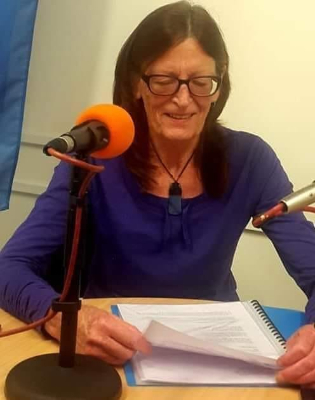
Tribute by Julie Webb-Pullman
Mercedes Jean Webb-Pullman, who died on 29 July aged 73, became a significant literary presence in New Zealand, most well-known for her poetry.
In addition to her 16 solo publications, Mercedes’ poetry and prose also appears in some 50 national and international anthologies. She was particularly proud of having a haiku – the only one from New Zealand – in 100 Haiku for Peace, an international publication in five languages, as well as a plaque with one of her poems on the Paekākāriki Arts Walk.
Mercedes was born in Kaitaia in 1950, and moved with her family to Napier aged 6, where she attended Marewa and Maraenui Primary schools, Napier Intermediate, and Colenso High School. After having UE accredited, she headed south, then for Australia at 18, to Thredbo Alpine Village in the Snowy Mountains.
Mercedes loved these mountains, and lived in the area off and on for almost 40 years, with periods in the United States and Sydney in between. During this time Mercedes became an acclaimed stained glass artist, receiving awards, and commissions from both civic and private buyers.
Mercedes Webb-Pullman started writing in 2007 after her brother Michael gave her a computer and connected her to the internet. She quickly made a name for herself in online poetry groups, and after coming back to New Zealand in 2008 and settling on the Kāpiti Coast, she returned to study, graduating from Victoria University’s International Institute of Modern Letters with an MA in Creative Writing in 2011.
In a 2018 interview, Mercedes said: “For me, good poetry opens up connections that are not always visible. Uses shock techniques to show me a hidden perspective. Shakes my status quo. Soothes and tricks me until I relax, then pounces. Does all that, while talking about something else.”
A reviewer of her collection AFTER THE DANSE remarked on Mercedes’ “…feminine sensibilities and mytho-poetic lyricism [which] dance like the flames of a candle. It is her voice – irreverent, direct, musical – singing with a playfully sinister passion, illuminating the dark chambers of the human heart…a pirouette into the blood and marrow of ruthless authenticity.”
Mercedes’ strong connection to Maori is found in both her stained glass work, and her writings. She donated a magnificent stained glass panel, Tame Iti’s Buttocks, to an auction to raise funds for the Urawera Four defence. Maori language, history and references are to be found throughout her work. A reviewer of her book Ono commented: “In ONO, indigenous Maori speech is illuminated through the subconscious of the observer, the meditations of the traveller, and the sensuality of the wanderer.”
Mercedes’ revolutionary politics found her included in Manifesto Aoatearoa: 101 Political Poems, as well as supporting Palestinian rights. A selection of her poems about Gaza and Palestine were translated into Spanish in 2016 and performed at Palestine Land Day protests in both Argentina and Spain. Her Gaza poems are read to English language students at the Islamic University of Gaza.
Mercedes will be remembered as a consummate wordsmith, an accomplished stained glass artist, a truly revolutionary spirit, and an anarchic, fiercely independent, funny, often-infuriating woman with an incisive intelligence and an equally incisive tongue.
Mercedes is survived by her first husband, Gary Milici, and four of her five siblings.
As per her wishes, Mercedes was cremated on 31 July. There will be a party to celebrate her life and work on Sunday, 28 July 2024 at St Peters Community Hall, Paekākāriki from 1pm-4pm, all welcome.
The Darkening by Mercedes Jean Webb-Pullman
After sunset she left.
Her shadow reached back.
As she drew nearer the trees
her shoulders turned in moonlight
and its cold fire burned her
blue as eucalyptus.
She seemed to rustle, now, with foliage;
a dryad whose roots coiled
within a cage of ribs, of rocks, of stone cliffs
and blanched forest bones, as if
a siege of leaf had won her.
Then, like a candle winking out,
she vanished.




































